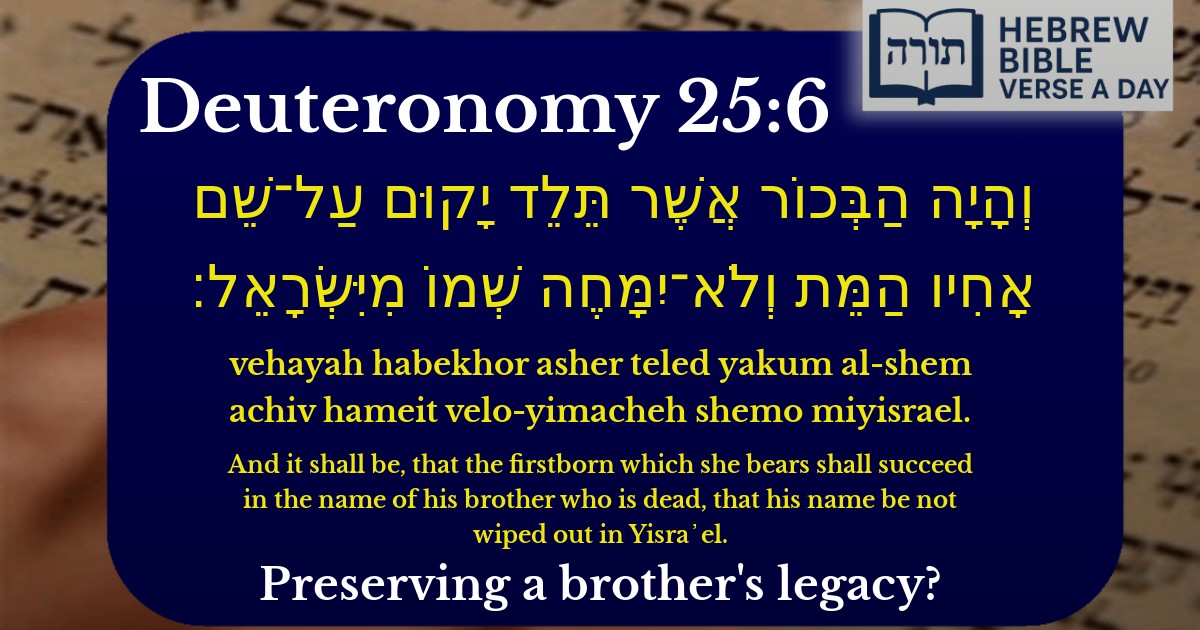Join Our Newsletter To Be Informed When New Videos Are Posted
Join the thousands of fellow Studends who rely on our videos to learn how to read the bible in Hebrew for free!
Hebrew Text
וְהָיָה הַבְּכוֹר אֲשֶׁר תֵּלֵד יָקוּם עַל־שֵׁם אָחִיו הַמֵּת וְלֹא־יִמָּחֶה שְׁמוֹ מִיִּשְׂרָאֵל׃
English Translation
And it shall be, that the firstborn which she bears shall succeed in the name of his brother who is dead, that his name be not wiped out in Yisra᾽el.
Transliteration
Vehayah habekhor asher teled yakum al-shem achiv hameit velo-yimacheh shemo miyisrael.
Hebrew Leining Text
וְהָיָ֗ה הַבְּכוֹר֙ אֲשֶׁ֣ר תֵּלֵ֔ד יָק֕וּם עַל־שֵׁ֥ם אָחִ֖יו הַמֵּ֑ת וְלֹֽא־יִמָּחֶ֥ה שְׁמ֖וֹ מִיִּשְׂרָאֵֽל׃
Parasha Commentary
📚 Talmud Citations
This verse is quoted in the Talmud.
📖 Yevamot 24a
The verse is discussed in the context of the laws of levirate marriage (yibbum), where the brother of a deceased man is obligated to marry his widow to perpetuate the deceased's name.
📖 Bava Batra 109b
The verse is referenced in a discussion about inheritance laws and the importance of maintaining a family's name and lineage.


Context of the Verse
This verse (Devarim 25:6) is part of the mitzvah of yibbum (levirate marriage), where a brother is commanded to marry his deceased brother's widow if the brother died childless. The purpose is to perpetuate the deceased brother's name and lineage in Yisrael.
Explanation of the Verse
The Torah states that the firstborn son born from the yibbum union will "succeed in the name of his brother who is dead." Rashi explains that this means the child will be called by the deceased brother's name in legal and familial matters, ensuring that the deceased's name is not erased from Yisrael. The Rambam (Hilchos Yibbum 1:2) elaborates that this mitzvah preserves the deceased's memory and inheritance rights.
Halachic Implications
Midrashic Insights
The Midrash Tanchuma (Ki Seitzei 2) connects this mitzvah to the broader concept of tikkun olam (repairing the world), as it rectifies the tragedy of a life cut short without progeny. The Sforno adds that this law reflects the sanctity of each individual's contribution to Klal Yisrael, as even in death, one's legacy must be preserved.
Philosophical Significance
Rabbi Samson Raphael Hirsch notes that this mitzvah underscores the Jewish value of zechut avot (merit of the fathers), where the deeds and identity of previous generations are carried forward. The child born from yibbum becomes a living testament to the eternal bond between past and future in Am Yisrael.